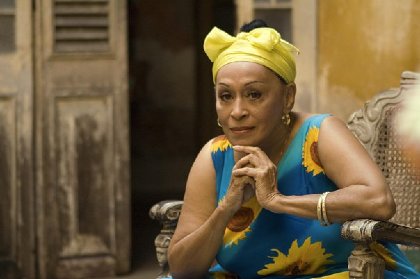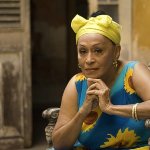- country:Cuba
- style(s):Cuban
- label:harmonia mundi SAS
- type:Band
- gender:female
- artist posted by:Montuno Producciones
Line up
- Omara Portuondo (voice)
Links
The story of the life of Omara Portuondo (Havana, 1930) reads like something out of a film script. The daughter of a well-to-do family and a mother of Spanish descent, she relinquished everything to marry a handsome black member of the Cuban national baseball team – a fact that she kept secret since mixed marriages were frowned upon in Cuba at that time – Omara’s first encounter with music was at a very early age. Just as in any other Cuban home, the future singer and her siblings grew up with the songs which her parents, for lack of a gramophone, sang to them. Those melodies, some of which still form part of her repertoire, were young Omara’s informal introduction to the world of music.
However, before taking up singing as a career, a fortuitous event led her to first try her hand at dancing, following in the footsteps of her sister Haydee, who was a member of the dance company of the famous Tropicana cabaret. One day, in 1945, two days before the opening night of a big new show, one of the dancers gave in her notice. Having watched her sister rehearse for hours on end, Omara knew the steps by heart and so was offered the vacant place in the company. “It was a very classy cabaret”, Omara recalls, “but it didn’t make any sense. I was a shy girl and was embarrassed at showing my legs”. It was her mother who actually convinced her not to let the opportunity go by and so she began a dancing career that led her to form a legendary duo with Rolando Espinosa and, in 1961, to become a teacher of popular dance at the Escuela de Instructores de Arte.
Omara and her sister Haydee also sang well-known American numbers with a group which included César Portillo de la Luz, José Antonio Méndez and blind pianist Frank Emilio Flynn. They called themselves Los Loquibambla and their style, a Cubanised version of the bossa nova with touches of American jazz, was known as “feeling”. In their radio debut, Omara was introduced as “Miss Omara Brown, the girlfriend of “feeling”.
In 1952, Omara and Haydee, together with Elena Burke and Moraima Secada, set up a vocal quartet, directed by pianist Aida Diestro. This group became one of the greatest in the history of Cuban music despite the fact that the original ensemble only recorded one single, in 1957 on the RCA Victor label. Omara stayed with the Quarteto Las d’Aida for 15 years. “We toured the States and Aida’s vocal arrangements were very original. Everywhere we went they cheered us and, when Nat King Cole played at the Tropicana, we went on stage to sing with him”, she recalls.
Magia Negra, Omara’s debut record, was released in 1959. It combined Cuban music with American jazz and included versions of “That Old Black Magic” and “Caravan”, by Duke Ellington. Despite having embarked on this solo project, Omara Portuondo continued as a core member of Las d’Aida. Two years later, she had to cut short a series of concerts at a Miami hotel and return to Cuba due to the Cuban Missile Crisis, which led to the breaking off of diplomatic relations between the USA and Cuba and to a long period of isolation for the Caribbean country. Omara stayed with Las d’Aida until 1967, when she decided to pursue a solo career. “So many singers had left the island that there was a gap that needed filling”, she says. Omara not only took on the role of her country’s representative at different international festivals but also consolidated her reputation at national level.
Omara later joined one of Cuba’s most important orchestras, La Orchesta Aragón, with which she travelled all over the world and also recorded several albums, such as the one she did with Adalberto Álvarez in 1984 and Palabras and Desafíos, both on the Spanish Nubenegra label and on which she was accompanied by Chucho Valdés.
However, what really catapulted Omara Portuondo to her well-earned fame was her appearance in the cinema in the mid-1990s. After collaborating in the recording sessions for Buena Vista Social ClubTM (World Circuit), on which she sang “Veinte Años” with Compay Segundo, Omara Portuondo, in a duet with Ibrahim Ferrer and deeply affected herself, gave a profoundly moving rendition of that heart-rending number “Silencio”. The success of “Silencio” gave a new impulse to Omara’s career and to those of other artists involved in the project. In the following years she travelled the world and recorded various songs with a star-studded group which included great names of Cuban music such as Rubén González, Orlando “Cachaíto” López and Manuel “Guajiro” Mirabal.
Omara was the star of the third launching of the Buena Vista Social ClubTM:: Buena Vista Social ClubTM presents… Omara Portuondo (World Circuit). Released in 2000, the album was enthusiastically received and, subsequently, Omara went on tour with Rubén González and Ibrahim Ferrer, thus giving a whole new generation of music lovers the opportunity to discover this illustrious trio live on stage. She toured Europe, travelled to Japan, and performed in the USA and Canada.
Omara went back to the studio to record her second solo album for World Circuit. Flor de Amor (World Circuit), which was produced by Nick Gold and Alê Siquiera, signals a change in direction in Omara Portuondo’s career: it is an album marked by a more subtle sound and a richness of texture. Omara brought in a mixture of Cuban and Brazilian musicians for this album, and it is this factor which influences the particular style of the music.
Omara returned to Europe in 2004 to promote the album, performing at such illustrious venues as the North Sea Jazz Festival, Marble Hill House in London, Olympia in Paris and the Concertgebouw in Amsterdam. That same summer, Omara gave the first concert at Berlin’s legendary Gendarmenmarkt. Before an audience of 7,000 people and accompanied by 68 musicians – among whom were members of the Deutsches Filmorchester Babelsberg Symphonic Orchestra, she was accompanied by a special guest and friend Ibrahim Ferrer. It was an unforgettable night which signalled the start of a new, ambitious world tour, the Projecto Especial Sinfónico, which in 2006 led to performances in the most important classical music festivals and theatres.
Before 2004 had come to a close, Omara received two great surprises: in Montreaux, the International Red Cross appointed her International Ambassador, making her the first Cuban artist to achieve such a distinction; and Flor de amor was nominated for a GrammyTM in the Best Traditional Tropical Record category. This was not, however, the only accolade that the record was to receive. In the 16th edition of the Billboard Latin Music Awards, in 2005, Flor de amor obtained the Tropical Record of the Year award.
Whilst touring in Brazil, Omara met one of the legends of Brazilian music, the singer Maria Bethânia. The two hit off, and they worked on recordings in Rio de Janeiro, with both Cuban and Brazilian musicians. The result, Omara Portuondo e Maria Bethânia (Biscoito Fino 2007) is a collection of Cuban and Brazilian songs, an album of mutual understanding between these sisters of the African diaspora.
In 2008, Omara started the year with the tour alongside Bethânia and later released Gracias (Montuno Producciones), the record that marks her sixtieth year in the music business. Recorded in Havana and produced by the Brazilians Alê Siquiera and Swami Jr, what better way to celebrate such an auspicious occasion than to recruit a first-class quintet? The three musicians that Omara has worked with in the past – pianist Roberto Fonseca, guitarist and musical director Swami Jr and percussionist Andrés Coayo, and the Israeli double bassist Avishai Cohen and the Indian percussionist Trilok Gurtu.
With Gracias, Omara’s aim was to relive the songs that she has found most moving and to work with the songwriters she most admires, such as Silvio Rodríguez, Pablo Milanés and Jorge Drexler, the latter being the composer of the record’s title-song and is specially dedicated to Omara. These are not, however, the only star guests at this event. If the list were not already impressive enough, other great names also are present: Chucho Valdés, who performs a number composed by Omara’s son; the brilliant African musician, Richard Bona; and the Brazilian maestro, Chico Buarque.
For album’s release, Omara has toured extensively across Europe, Latin America and the Far East. Omara was one of the first Cuban artists to play in USA for six years, performed two critically acclaimed concerts in San Francisco and Los Angeles.
The following month the album Gracias won the Latin GrammyTM Award for the Best Contemporary Tropical Album. It was a very special night as Omara was there to receive the prize in person and she also presented one of the awards, the first time that a Cuban artist has done this. The album was also later nominated for a Grammy in the Best Tropical Latin Album category.
After touring with the Orquesta Buena Vista Social Club in Europe during 2010, Omara releases here latest recording, Omara & Chucho (Montuno Producciones) in Spring 2011. It has been no mean feat to bring together two shining examples of Cuban music together on the same project, Omara and the pianist Chucho Valdés. 14 years after their last joint album, they reunite once again to continue unravelling the thread of their first joint project, exploring the intimacy of a duo arrangement recording a selection of Cuban and Latin American classics. On Omara & Chucho they show us their talents in the simplest, most unclad manner on a context that enables them to lay emphasis on some of the features that been characteristic of their music at various stages in their careers.
As friends do, they place their trust in one another without giving it a second thought and devote themselves to their repertoire. Omara & Chucho relives the music that tells both artist’s history, a full declaration of love and admiration, of the love they feel for one another, but also of the love they hold for that which has brought them together: music.
The duo will be accompanied on tour with a small band of drums, double bass and percussion, presenting this new release at some of Europe’s most important venues and festivals.
Omara will also tour with the Orquesta Buena Vista Social Club later in the summer, both in Europe and in the USA, where they will also include a date at Los Angeles’ Hollywood Bowl.



